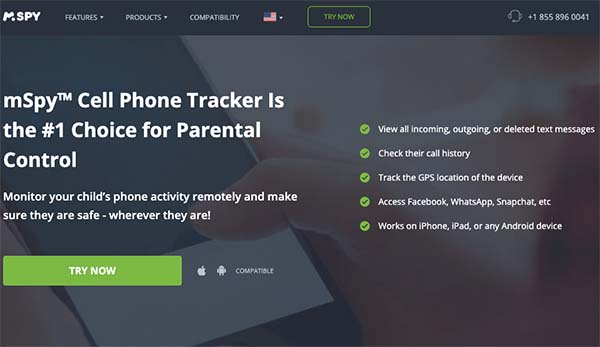The internet truly has opened a whole new world to us all. It’s so much easier to communicate with people anywhere in the world via the internet. Whether it is for work, play, or socializing, the internet has made everything a whole lot easier to do.
What the internet has also done, however, is open up doors to some dangerous places for young children and teens. They can get caught up in all the excitement of trying out new things that they completely forget to be concerned about their safety.
The Need for Spy Apps
That is why parents today try so hard to monitor their kids’ activities on their phones. Many kids get contacted by cyber criminals every day and fall into dangerous situations. Getting solicited by strangers on social websites and access to inappropriate sexual content are two of the most common reasons parents want to spy on their children’s phones.
The Use of Spy Apps
Phone spy apps are those which can be installed on a device such as a phone so that it can log all the activities taking place on the device and upload it to your account for review. This helps parents decide when it’s time for them step in, in order to keep their kids safe from unpleasant situations.
Choosing the Right Spy App
There are a lot of spy apps that can be used to monitor a phone. These range from basic to advanced, and are sure to fulfill all your needs.
In order to choose the right spy app for your needs, you should know what you require from it. Most applications with allow you to see your child’s social accounts, emails, which applications and programs are opened and how they are used, which websites are visited etc. In other words, almost everything your child does on a phone will be recorded and sent to you via an online account.
There are also apps that can go as far as show you what your child is doing in real-time. All of these apps work in complete stealth, so you shouldn’t be worried that your child will discover them. Before choosing the spy app you are going to use, you should always go through some user reviews to see if the app even works as advertised. There are also many lists that you can find showcasing the best apps for mobile phone to help you make your decision.
Make your choice, install, try and be calm for the health of your children. If you are in doubt about this decision, think again about the possible consequences and how you can get rid of annoying restless feelings. You do not interfere in the private life of your beloved child, but protect him from possible ills.
If you are looking for a spy app to track your child’s activity, here is a list of some of the best for multiple platforms:
1. mSpy
This is a specialized surveillance application for total parental control. A great advantage of the product is an integrated approach to monitoring social networks. It is obvious that the child is present and communicates not only in one social network from a number of popular ones.
mSpy allows you to see, for example, messages as they arrive in real-time in snapshot, along with multimedia files and recording of calls. All this is available for mobile operator services, as well as WhatsApp, Snapchat, Instagram etc.
2. Mobile Spy
This is a simple and reliable means for surveillance. And this is the choice of parents who are not understand modern technologies to the full and do not want to seek to understand a number of functions for tracking in different modes. The application allows you to keep the information open, make real-time snap monitoring 24/7 and that’s all you need.
3. FlexiSpy
This snap spy allows you to open and collect any data taken from the Snapchat. It interacts easily with all popular operating systems.
Most Popular Cell Phone Tracking Features for Parents
Cell phone tracking has slowly gained a lot of popularity among parents lately. It is not easy to deny young children their wishes and requests for a new phone in a world dominated by smart gadgets, so parents have to rely on cell phone tracking apps to make sure their children are out of harm’s way.
Most modern cell phone trackers provide parents with a huge catalogue of features. These range from simple monitoring features to those like remotely blocking apps and webpages. But what features should you be most concerned with? Here is a list of all the popular features that parents normally use to track their children’s smartphone usage:
1. The Basic Features:
The most basic and common features that parents use in cell phone tracking apps are monitoring SMS messages, emails, contact lists, and call logs. All of these provide parents with a basic knowledge of what their children are doing on their phones and who they are contacting. This helps parents in deciding whether or not they need to keep more in-depth tabs on their phones.
2. Monitoring Media Files:
Many parents are worried of the kind of media their kids have on their phones, which is why they monitor their phone’s gallery as well. Children may get in trouble for sharing inappropriate media with their friends, and with sexting becoming a major issue, it is natural for parents to be concerned about these things.
3. Seeing App Usage:
Another point of worry for parents is which apps their children use. Many IM applications like Snapchat today have become famous for kids, which they use to send and receive messages and media files. These are the apps that can lead to sexting, and parents like to keep an eye on their usage. They can go one step ahead by blocking certain apps from being used on the target phone.
4. Browser History:
Monitoring what sites the child is visiting on a daily basis is also a reason why parents opt for cell phone tracking apps. Children may gain access to inappropriate websites or those that can be dangerous. Many apps allow parents to block the child’s access to such webpages as well.
5. The Child’s Location:
Teenage is a time that is hard on the parents because teenagers usually resort to revolting against their parents if they try to ‘control’ their lives. This is the time when children can fall into the wrong company and get into dangerous activities. Almost all cell phone tracking apps lets parents track the phone via its GPS capabilities. Some apps go a step further by turning the target phone into a listening device so parents can find out exactly where their child is and what kind of people he or she is with.
Alternative Software to use
No matter how effective conversations and individual spyware for certain data sources are, let’s take a look at the global software tools that will help organize your day-to-day protection of the child’s information space.
1. Windows 10: Microsoft Family Security
Windows 10 has changed not only externally, but in the context of the approach to protecting children according to earlier versions. First of all, you can create “child account” for child use cases. Your full access will be protected with a password, and the child will receive limited options after turning it on. The data of each user is collected in a separate center. So you see the time and ways of PC’s use.
To prevent uncontrolled purchases of games, applications and other content, you can install “credit.” That means you’ll add some funds that kid can spend online for everything he wants.
Binding a computer to a child account allows you to use a means of limiting the time of the child’s presence behind the PC. It’s simple: you choose the number of hours per day when the computer will work for the child. You can also specify the exact time of use (for example, from 6 to 9 pm).
To control the child’s presence on the Internet, you can create the list of available sites. Other addresses will not work for your kid.
Also, an additional content filtering tool is built into the operating system. It should be used in parallel with similar web-tools.
2. Let the router help you
You can install multiple security extensions for the browser or support software directly to the PC. But you can configure the general protection through the router. This is a box with bulbs that distributes the Internet in your home or, in other words, serves as an Internet access point for all devices in your home. That is, you can take software that will simply filter all the content passing through it.
An example of such system is Familyshield, If filters content, but there’s a problem with the settings. First, here is no flexibility in settings. Secondly, the filter works with all connections through your access point, even your phone and PC.
Also you can find more flexible stuff like Sky Broadband Shield.
Here you can set time limit of filtering, and all devices in the house will work fine after you send the children, for example, to sleep.
But remember that this is only for your home network. 3G and 4G networks on mobile devices do not fall under restrictions, as well as any other Wi-Fi networks without a password, which your children can accidentally find and connect at home.
3. Browser parental controls
You need to focus on children PC and phones only, if “hammer blow” on the home Internet as a router setup looks wild for you.
The idea is to create profiles with limited access on a computer and a tablet (for example, in Chrome and Android). Children simply will not be able to buy applications or visit specific sites without the knowledge of the administrator (it’s you). But these hardware parental controls through browsers and operating systems have their own holes, due to which the child can find a way to do whatever he wants.
4. Parental controls for iPad & iPhone
Let’s discuss the issue of Apple products separately. We will work with the child’s device directly. Go to “Settings” – “Restrictions”. Enable restrictions there, then set the password (and you child will not be able to change the situation). Choose the restrictions you need and keep the situation under control in the future.
Conclusion
Being a parent on the Internet is difficult. None of the described features gives 100% guarantee of child protection, but a set of activities can help you for real. Use several technical ways of protection at once and they will give a cumulative effect. Make your choice according to the individual situation. The main tool is communication and upbringing. You must be involved in the child’s personal space without unnecessary pressure, and you will be able to secure kid effectively.


